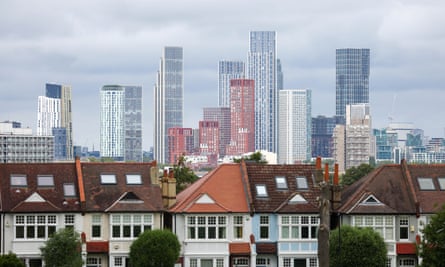“It’s a bloodbath, that’s the way I’d like to describe it,” says John*, a father of two struggling with the ever-increasing interest rate on his home loan.
He is one of the 1.4 million people in the UK on a variable rate residential mortgage, who have watched the monthly payments soar after the Bank of England raised the base rate 13 times in a row to 5%.
Policymakers are widely forecast to add another 0.25 percentage points to that figure when they meet on Thursday, leaving homeowners such as John having to find hundreds more pounds to cover future bills.
The software engineer, who lives in Slough, Berkshire, says that could leave him with no choice but to get a second job to make ends meet, so he is looking into zero-hours options such as delivering for Uber Eats so he can still spend some time with his family.
He is the sole earner, with an annual salary of £80,000, which he says had been comfortable, but the pressure of rate rises coupled with the increasing cost of food and energy bills have made it hard to make ends meet.
There are a number of reasons why a homeowner may be on a variable rate. They may not have wanted to lock in to a fixed deal when rates were high, believing interest rates would drop.
Roughly half of those on such mortgages are on a tracker or discounted rate deal, which are directly linked to the base rate, with the remaining 50% on a standard variable rate. SVRs rise at the lender’s discretion, most of which will go up, though not necessarily by the full rise implemented by the Bank of England.
“When I took the variable rate I had no option because at the time Liz Truss was in office and fixed rates were not attractive at all,” John says.
“I was originally paying £1,400 when I took out the variable rate mortgage. I received a letter a couple of weeks ago and my new payment is going to be £2,770 … another interest rate hike or two will mean I have to get a second job, this is how bad it is. It’s not like it’s just the mortgage, it’s the energy prices; it’s the food prices that are still high.
“If there weren’t these interest rate hikes I’d say I’m making a very comfortable living. Even with that salary I’m finding it hard to survive.”
He is now on a 5.89% rate after speaking to his lender about his financial worries and securing a 3.3% discount. “Every day I wake up and I check what the analysts are saying [about interest rates] because this is the centre of my world right now.”

Sophie Mohamed, 38, had planned to sell her flat to move to a bigger home after becoming pregnant in March 2021. However, she is unable to sell the property in Bethnal Green, east London, until cladding inspections have been completed.
The TV producer secured consent to let out the two-bed shared ownership property but was able to get only a variable deal after her fix ended, meaning her rate has soared from 1.68% to 6.68% – and will continue to go up in line with the Bank measure.
The £1,500 rent she charges her tenants no longer covers the £900 a month mortgage on her 35% share of the property and the £800 service fee and rent on the portion of the flat still owned by the housing association. “It’s doubled in the space of around six months,” she says.
“I’m not somebody who bought that flat to become a landlord and let it out, I’ve been forced to become a landlord. I have good tenants in that flat but the rent that they pay no longer covers that mortgage.
“It’s very difficult because I don’t want to lose those tenants, I don’t want to be a landlord, I’ve got good people in there and I don’t want to jeopardise that relationship but I have my own home to pay for as well.
after newsletter promotion
“Essentially, I will have to increase their rent but if I do I risk losing them and that puts me in a difficult position.
“We’ve also had a baby so we’ve got childcare costs on top of that. So we’re both working and although our salaries aren’t bad salaries, because of the increases that have happened it is definitely more of worry.”
Liz*, a journalist, relocated from London to Cardiff last year for work, and she and her partner have also been unable to sell their flat in the UK capital, nor rent out it because it is a shared ownership property.
As rates increased, so did her mortgage payments – from £810 a month to £1,147 – as did the rent and service charge she pays to the co-owner, a housing association, which comes to £850.
The mother of two says she and her partner have used up £20,000 of their savings and have had to borrow from parents to make ends meet, as they must also cover the rent on their home in Wales.
“We knew we were going to move and so when our mortgage came to the end of its term in May last year, we didn’t renew on a fixed rate which is how we ended up on a variable mortgage,” she says.
“We were on a 1.45% rate until 30 April and on 1 May we moved to a standard variable rate which is 3.49% above the Bank of England rate which took us to 4.24%. Our payments went from £588.65 to £810.19. It was already quite a big jump, if only it had stopped there.
“According to the latest letter from the bank, we have a rate of 8.49% from the 1 August. It was 7.99% before, which was £1,147.26.”
She is waiting for Thursday’s announcement with “trepidation, because every little rise is reflected in much higher terms for us”.
“It has wiped out our savings because we are double paying [the mortgage and to rent a home], it has literally wiped them out over the last year, and unless we can sell, we are getting in a more and more difficult situation.”
*Name changed to protect anonymity











